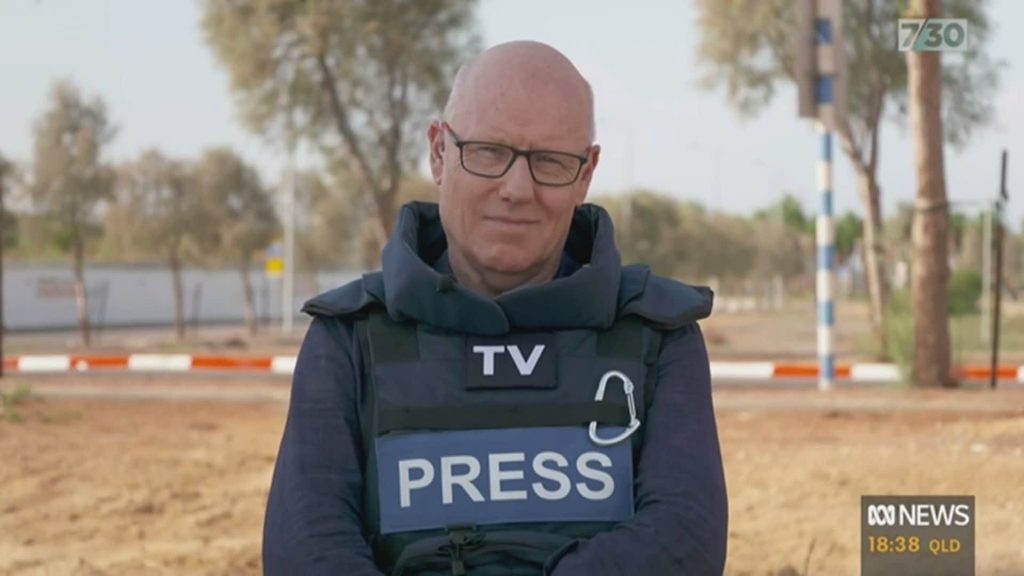Australia/Israel Review
Media Microscope: The media’s hospital handpass
Nov 2, 2023 | Allon Lee

A massive blast that engulfed the car park of the Al-Ahli Arab Hospital in Gaza at 7pm (local time) on October 17 marked a pronounced drop in the sympathetic coverage that Western media outlets extended to Israel following the massacre by Hamas terrorists of more than 1,400 Israelis, most of them civilians, alongside acts of rape, torture and kidnapping, on October 7.
As AIJAC’s Oved Lobel wrote on the Sky News website (Oct. 24), “far too many Western media organisations appeared to uncritically accept as indisputable fact a claim that Israel had bombed a hospital in Gaza, killing up to 500 Palestinian civilians. The sole source? The Gaza Health Ministry. That is, Hamas. The same Hamas whose officials continue to claim that they did not kill any civilians on October 7 despite broadcasting and livestreaming the slaughter themselves.”
Very quickly “photographic and video evidence… clear[ly showed] that the rocket had actually fallen on the parking lot next to the hospital, and the hospital itself was largely undamaged. As for fatalities… One European official estimated 50 or less.”
Australia was just waking up when the blast happened and it appears that meant that, unlike overseas, most local reports had time to include Israel’s claim it was an errant rocket fired by Palestinian Islamic Jihad (PIJ) which caused the blast.
The Guardian Australia’s live feed on Oct. 18 implied it was likely Israel’s fault, citing Middle East correspondent Bethan McKernan’s opinion that “the scale of the blast appears to be outside” PIJ’s “capabilities”. The next day, however, the paper conceded Israel didn’t appear responsible.
An ABC News “X” post at 6.30 am on Oct. 18 tiptoed around the issue of responsibility, asserting that “an Israeli air strike has killed hundreds of Palestinians at a Gaza hospital… health authorities in the besieged enclave say.”
An SBS TV “News in Arabic” report (Oct. 18) strongly implied Israeli culpability, twice claiming “a guided missile… targeted” the hospital. The report included footage of IDF spokesperson Daniel Hagari’s briefing, with the reporter saying, “the Israeli army… point[ed] the finger at the Islamic Jihad movement.” It did not include any of the extensive evidence Hagari offered to prove that blast was caused by a PIJ rocket. Subsequent editions did not report on the growing consensus the blast was not Israel’s fault.
In contrast, the corresponding episode of SBS TV “World News”, noted Israel presented “some new imagery which suggests that the explosion took place in the hospital car park rather than in the hospital itself and questioned the fact that there doesn’t appear to be a crater in those images. They also presented what they say are intercepted communications between Hamas militants acknowledging that the blast was the result of a rocket misfire [by Islamic Jihad].”
The ABC’s coverage, especially on TV, seemed allergic to properly sharing and evaluating the evidence Israel presented to clear its name.
On Oct. 18, ABC RN “Breakfast” host Patricia Karvelas asked, “Does Israel’s right to defend itself extend to bombing hospitals?” implying it was the culprit.
ABC TV “7pm News” (Vic) that night included Hagari saying, “this is the responsibility of Islamic Jihad,” but the report didn’t say what Israel’s evidence was. In the following edition, ABC Middle East correspondent Allyson Horn said, “Israel says the blast occurred when a rocket launched by the Islamic Jihad group misfired, releasing video and audio to back up its claim.” However, no details or examples of the video or audio were aired.
The webpage of ABC TV “7.30” that night promoted a report with the misleading tagline, “What do we know about the Gaza hospital blast so far?” The item briefly noted both sides blame the other, but this was not its main focus.
ABC Global Affairs Editor John Lyons, reporting from Israel, seemed very averse to discussing the evidence regarding responsibility for the blast.
Instead, Lyons relied on a stock answer which framed Israel’s attacks on Hamas positions in Gaza as excessive. On ABC Radio “PM” (Oct.18) he said that “after dropping 6,000 bombs over the last ten days, which Israel has done, in the Muslim and Arab world, they certainly are taking the version or believing that it was Israel.”

ABC Global Affairs Editor John Lyons appeared fiercely determined not to offer any opinion on the responsibility for the hospital explosion (Image: ABC/ Twitter)
On Oct. 18, ABC TV “The World” host Beverley O’Connor twice tried to elicit Lyons’ opinion, but he again refused to say, deflecting to speak again about the “6,000 bombs” Israel had dropped and the Arab reaction.
The nearest Lyons came to expressing a definitive answer was in response to a question from ABC Radio “This Week” host David Lipson (Oct. 20), who mentioned the growing consensus a PIJ rocket was responsible, and asked, “what do you make of this tragedy?”
Lyons’ response was messy, saying, “I think there is serious doubt. I mean, both sides are claiming the others did it. The Israelis have presented what looks, on the face of it, compelling evidence that it wasn’t one of its rockets. I think in a way, until there’s an examination [we] will never know.”
A five-minute item on ABC Radio “PM” (Oct. 19) was one of the few instances where the Israeli evidence was properly reported on and evaluated by the ABC.
Canadian academic Michael Armstrong said, “my first impression is that’s not a bomb blast… The aftermath we see looks much more like a rocket hit than a bomb.”
Also included was Australian Strategic Policy Institute (ASPI) analyst Nathan Ruser, who had said on his “X” page that the “photos of the scene are, to me, not consistent with an airstrike and are not consistent with claims that 500+ people were killed.” But none of this appeared in the radio spot. Instead, Ruser was merely quoted saying, “independent reporters and eyewitnesses” cannot speak freely in Gaza and “people… bend facts and…reality to support what they believe is the overall truth.”
ASPI analyst Malcolm Davis’ commentary on ABC TV “News” (Oct. 18) that Israel was not likely to “attack… a hospital full of civilians right at the point when it’s in their strategic interests to ensure as much international backing as possible,” was picked up by other media outlets.
Finally, IDF spokesperson Peter Lerner was given ample time to explain why Israel did not cause the blast during an interview with ABC TV “7.30” host Sarah Ferguson on Oct. 19.
Meanwhile, a rambling article on the ABC website (Oct. 19), co-authored by former ABC Middle East correspondent Eric Tlozek and social media producer Maryanne Touak – who shared a post on her Instagram account that blamed Israel for the blast and accused it of genocide – looked at some of the competing claims, but ignored the intercepted audio between the Hamas terrorists and didn’t quote any experts.
By stark contrast with the ABC, evening news programs of Channel 7, 9 and 10 (Oct. 18-20), had no issue broadcasting the audio and video evidence provided by Israel.
However, on Oct. 18, Channel 10’s report falsely claimed the “hospital left a burning shell” while Channel 9’s Melbourne newsreader Peter Hitchener claimed as fact “800 people, many children, killed” and “a hospital blown apart.” Reporter Bret McLeod said “hospital reduced to a burning wreck” – all factually incorrect.
On Sky News (Oct. 19), Izzat Abdulhadi, the Palestinian Authority’s representative in Australia, clashed with host Peter Stefanovic after Stefanovic asserted that, whether it was an Israeli strike or misfiring PIJ rocket, ultimately the blast happened because terrorists “routinely” fire rockets at Israel from adjacent to schools and mosques, which increases the chances of misfires or Israel responding to the source of the attack.
Abdulhadi rejected this as “Israeli propaganda.” Stefanovic replied, “I’ve been to Gaza and I’ve seen all this myself.”
Writing in the Australian (Oct. 21), former Age newspaper editor Michael Gawenda said too many in the media were failing their ethical requirements of “fact-seeking and fairness”, as seen in the uncritical acceptance of Hamas’ claims that Israel had deliberately carried out a massacre at the hospital.
He criticised his former employer for running an op-ed with the headline, “This is a massacre: Basic humanity has to be restored in Gaza.”
Gawenda said “a massacre is the deliberate killing of defenceless human beings. That was the headline The Age considered appropriate for this piece of commentary, based entirely on the Hamas story of what had taken place, and given prominence on The Age website. And it was still there, prominently displayed on Thursday when it increasingly was clear that the explosion… was the result of a misfired missile by the terror group Palestinian Islamic Jihad.”
In the Daily Telegraph (Oct. 20), former MP and Australian Ambassador to Israel Dave Sharma took issue with politicians who had too readily accepted the Hamas claims, writing, “they should wait for the facts before pronouncing judgement. And in this conflict, our politicians would be well-advised to attach more credibility to Israel… than Hamas.”
On Oct. 25, the Australian editorialised that “too often… [when] Israel has been under attack, commentators have readily accepted the claims of terrorist groups [but] treated whatever Israel says with disdain.”
Tags: Australia, Gaza, Hamas, Israel, Media/ Academia






